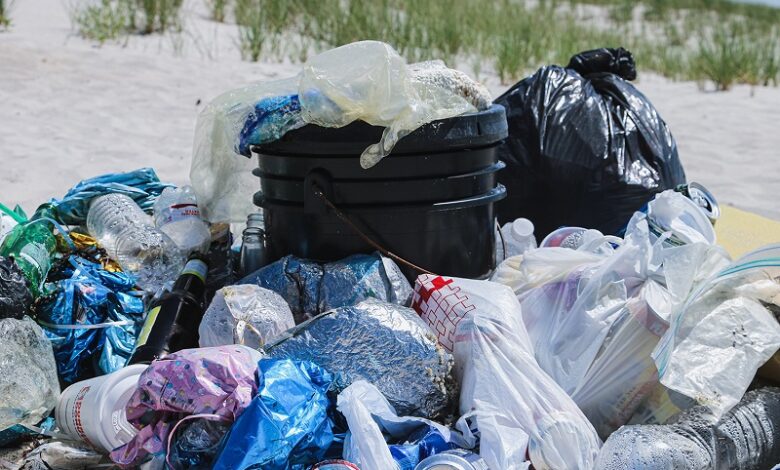Plastic Pollution Crisis in Africa: A Growing Threat That Demands Immediate Action

Edited by Agnibeena Ghosh
Plastic waste is becoming an overwhelming problem in Africa, particularly in sub-Saharan regions, where it is proliferating at an alarming rate, surpassing the growth seen in any other part of the world. Recent analysis has shed light on the severity of this issue, revealing a startling reality. According to a study conducted by the charity Tearfund, at the current rate, an amount of plastic waste equivalent to covering a football pitch is openly dumped or incinerated in sub-Saharan Africa every single minute.
If this concerning trend persists without intervention, the projections for the region are dire. By the year 2060, sub-Saharan Africa is estimated to accumulate a staggering 116 million tonnes of plastic waste annually, which is a sixfold increase compared to the 18 million tonnes generated in 2019. The primary driving force behind this surge in plastic consumption within sub-Saharan Africa, where 70% of the population is under the age of 30, is the escalating demand for products like vehicles and various consumer goods due to rising incomes and population growth. This escalating demand for plastics is part of a global trend, with worldwide plastic use expected to nearly triple by 2060.
This impending crisis of plastic waste in sub-Saharan Africa is a cause for great concern, especially since many of the countries within the region lack the infrastructure and resources to effectively manage and address this mounting issue. These alarming statistics have come to light just before a crucial meeting of governments in Nairobi, Kenya, where the focus will be on formulating a United Nations treaty aimed at combatting plastic pollution.
Rich Gower, a senior economist at Tearfund, emphasized the gravity of the situation, stating, “The signs of environmental breakdown are all around us, but this treaty has the potential to curb the plastics crisis and improve the lives of billions of people.” He pointed out that a significant portion of the plastic being consumed in sub-Saharan Africa is in the form of plastic packaging, which often ends up being carelessly discarded and burned. Gower urged negotiators at the upcoming UN treaty discussions in Nairobi to agree on substantial reductions in plastic production and to prioritize waste pickers, who play a pivotal role in collecting 60% of all globally recycled plastic.
In the absence of comprehensive global regulations, it is the people in developing countries, as well as the waste pickers who collect and handle the waste, who disproportionately bear the brunt of the environmental and health consequences of plastic pollution. Dr.TiwongeMzumara-Gawa, a waste campaigner from Malawi who will be participating in the negotiations in Kenya, stressed the urgency of the situation. She said, “While these negotiations continue, the health of people in Malawi and across Africa is being impacted by plastic pollution every day.”
The implications of this burgeoning plastic waste crisis are far-reaching, affecting not only the environment but also the health and well-being of millions of people. Plastic pollution poses a direct threat to aquatic ecosystems, wildlife, and human health. It clogs waterways, disrupts ecosystems, and leads to the ingestion of plastic particles by marine life. In regions like sub-Saharan Africa, where access to clean water and sanitation services is already a challenge, the unchecked proliferation of plastic waste exacerbates the problem.
The rapid increase in plastic consumption is closely tied to economic growth and urbanization in the region. As more people in sub-Saharan Africa experience rising incomes and urban lifestyles, the demand for consumer goods and packaging, often made from plastic, escalates. This leads to a surge in plastic waste generation as well. While economic development is essential for improving the quality of life for the people in this region, it must be balanced with responsible waste management practices to prevent environmental degradation.
Moreover, plastic pollution is not only an environmental issue but a social and economic one as well. Waste pickers, who play a vital role in collecting and recycling plastic waste, are a significant part of the solution to the plastic crisis. These individuals often work in challenging conditions, with minimal job security and limited access to healthcare and education. They are unsung heroes who contribute to reducing the environmental impact of plastic waste, yet they remain vulnerable to the negative consequences of the plastic pollution problem.
The urgent need for a coordinated global response to address plastic pollution cannot be overstated. The upcoming UN treaty discussions in Nairobi present a crucial opportunity for countries to come together and establish effective measures to combat the plastic crisis. This treaty should focus on reducing plastic production, promoting recycling and waste management infrastructure, and elevating the status of waste pickers, ensuring that they receive fair wages and better working conditions.
While the onus of responsibility falls on governments and international organizations to formulate and implement policies and regulations, individuals and businesses must also play a role in reducing their plastic footprint. This includes adopting sustainable practices like reducing single-use plastics, promoting recycling, and supporting initiatives that raise awareness about the environmental impact of plastic waste.
(Source: The Guardian)
(This story has not been edited by News Mania staff and is published from a Media Release)






